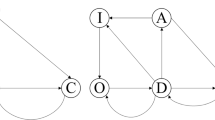Abstract
Inspection games are 2x2 games in which one playermust decide whether to inspect the other player, who in turnmust decide whether to infringe a norm or a regulation.Inspection games have a single, mixed strategy Nashequilibrium, which has counter-intuitive comparative staticsproperties. This result has been used by Tsebelis (1989) andHoller (1992) to show that the economic approach to lawenforcement is not likely to generate clear-cut predictions.In this paper I discuss a variant of the inspection game inwhich the inspector can act as a Stackelberg leader. I willalso show that this version of the inspection game hascounter-intuitive comparative statics properties. Inparticular, increasing inspector’s incentives to enforce thelaw increases the frequency of law infractions.
Similar content being viewed by others
References
Beccaria, C. (1767). On crimes and punishments, and other writings. In R. Bellamy (Ed.). Cambridge, MA: Cambridge University Press, 1995.
Becker, G.S. (1968). Crime and punishment: An economic approach. Journal of Political Economy 76: 169–217.
Bentham, J. (1789) An introduction to the principles of morals and legislation. Anchor Books 1973.
Bianco, W.T., Ordeshook, P.C. and Tsebelis, G. (1990). Crime and punishment: Are one-shot, two person games enough? American Political Science Review 84: 569–586.
Cheng, L.K. and Zhu, M. (1995). Mixed-strategy Nash equilibrium based upon expected utility and quadratic utility. Games and Economic Behavior 9: 139–150.
Cox, G. (1994). A note on crime and punishment. Public Choice 78: 115–124.
Fudenberg, D. (1992). Explaining cooperation and commitment in repeated games. In J.J. Laffont (Ed.), Advances in economic theory. Cambridge: Cambridge University Press.
Fudenberg, D. and Levine, D.K. (1989). Reputation and equilibrium selection in games with a patient player. Econometrica 57: 759–778.
Fudenberg, D. and Levine, D.K. (1992). Maintaining reputation when strategies are imperfectly observed. Review of Economic Studies 59: 561–579.
Garoupa, N. (1997). The theory of optimal law enforcement. Journal of Economic Surveys 11: 267–295.
Hirshleifer, J. and Rasmussen, E. (1992). Are equilibrium strategies unaffected by incentives? Journal of Theoretical Politics 4: 353–367.
Holler, M.J. (1992). Fighting pollution when decisions are strategic. Public Choice 76: 347–356.
Polinsky, A.M. and Shavell, S. (2000). The economic theory of public enforcement of law. Journal of Economic Literature 38: 45–76.
Tsebelis, G. (1989). The abuse of probability in political analysis: The Robinson Crusoe fallacy. American Political Science Review 83: 77–91.
Tsebelis, G. (1990a). Are sanctions effective? A game theoretic analysis. Journal of Conflict Resolution 34: 3–28.
Tsebelis, G. (1990b). Penalty has no impact on crime: A game theoretic analysis. Rationality and Society 2: 255–286.
Wittman, D. (1985). Counter-intuitive results in game theory. European Journal of Political Economy 1: 77–89.
Wittman, D. (1993). Nash equilibrium vs. maximin: A comparative static analysis. European Journal of Political Economy 9: 559–565.
Author information
Authors and Affiliations
Rights and permissions
About this article
Cite this article
Andreozzi, L. Rewarding Policemen Increases Crime. Another Surprising Result from the Inspection Game. Public Choice 121, 69–82 (2004). https://doi.org/10.1007/s11127-004-6166-x
Issue Date:
DOI: https://doi.org/10.1007/s11127-004-6166-x




